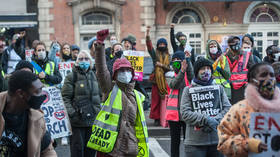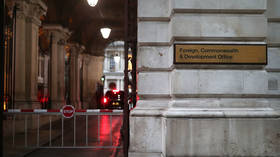Liberals’ refusal to address the thorny issues around race has a disastrous effect on efforts to improve the lives of black people

Taking a monochrome approach to race as the key to addressing socio-economic problems, BLM-supporting liberals are ignoring divisions between ethnic communities and making life even worse for struggling black Britons.
The long-unchallenged liberal view that racism, police brutality, a colonialist education curriculum and white privilege are all contributing to holding back struggling communities from escaping socio-economic difficulties is nonsense, and it’s time we ditched using the colour of people’s skin as the basis of our approach – despite what supporters of Black Lives Matter (BLM) might think.
Public policy should focus on addressing socio-economic issues across the board, free from the constraints imposed when seeing all issues through a prism of race. And continuing to lump various ethnicities together into a homogenous BAME (black, Asian and minority ethnic) community is not only ignorant and insulting, it’s also wrong.
However, don’t take my word for it when there are better sources out there.
And there they were last night; speaking at the launch of Dr Rakib Ehsan’s report for the Henry Jackson Society, ‘BLM: A Voice For Black Britons’, a panel of four brave souls, hosted by Esther Krakue, who refused to shy away from talk that would silence a dinner party and have fretful woke simpletons reaching for their coats in the liberal circles of London.
An overarching theme that hit me was the whole way we talk about race: tip-toeing around the language, inventing acronyms and bundling communities together, all with the best of intentions, is actually no help at all and in reality is making things worse.
The BAME label is part of this. It groups together communities that have nothing much in common as it attempts to make race the starting point for not only identifying who apparently needs help, but who will receive that help. This in itself has caused problems in the UK, specifically the rise of “competitive victimhood”, said Dr Remi Adekoya, where arguments arise over who deserves the most empathy: blacks, Muslims, Bangladeshis... take your pick.
He quickly dismissed the use of BAME as a handy administrative term, pointing out that no person with black or brown skin ever identified themselves with the acronym. “There is no such identity like that,” he said. “There are huge differences even within the black communities here in Britain. It’s an outdated concept.” And Adekoya wasn’t alone in holding this view.
Fellow panellist Calvin Robinson agreed. “It makes people feel good using the term BAME. People won’t use the word ‘black’ – ‘can I say black, is that appropriate?’ – so they’ll use the word ‘BAME’ in order to walk on eggshells,” he said. “There is no one big homogenous group. Even with black people, there are so many different groups and so many different communities, just as there are with every race.”
Those differences are not just about faith and family or food and music, they give rise to a subject that makes liberals squirm in their seats, a pearl-clutcher’s taboo: racism between minority communities.
“Amongst the BAME communities themselves, there is a lot of inter-racial discrimination going on that never actually gets addressed,” Robinson continued.
“I never hear anything about this in the mainstream media. We tend to perceive racism these days as a power struggle between black people and white people which, of course, is completely untrue because racism is discrimination based on ethnicity, and anyone can be racist.”
Of course, suggesting that huge differences exist not only between the wider BAME community but even within the minority black community itself throws a real spanner in the diversity works. It doesn’t fit the idea of using ethnicity to underpin social policy.
Also on rt.com Paying the rioters and handcuffing police will only lead to more crime and more victims in minority communitiesYet the reality is, as Adekoya pointed out, that there are huge differences in the UK between black African and black Caribbean communities. The ICM poll that accompanies the report under discussion revealed that British Africans are far more likely to be positive towards Britain, hold some sort of faith and be part of strong family structures – all of which informs their broader attitudes – than their Caribbean counterparts.
Black Caribbeans do underachieve in education and this, it was pointed out, is used to tell them at school that the system is rigged against them, that it’s feeding this disadvantage and, therefore, they are victims of racism. This belief takes root and is blamed for any failure to succeed that follows, while also seeming to prove that the system is racist.
And that’s where the Marxists of BLM step in. If this system is the reason for your disadvantage, the system is wrong. So let’s smash it! Defund the police! Dismantle capitalism! Revolution!
Marginalised individuals are far more likely to follow this advice than those fitting in to society.
However, the draw of Black Lives Matter for black communities in Britain was not the clarion call the mainstream media might have had us believe last summer, nor is it the answer to the very specific problems faced by the black communities in this country. In fact, while black Brits in general were largely happy with the issues raised by BLM, they found their methods of protest, such as tearing down statues and civil disobedience, “abhorrent”, according to Robinson.
“People copy and pasted the drama from America over here and it just doesn’t suit, it wasn’t relevant. The police over here don’t carry guns, they don’t kneel on black people’s necks,” he said.
It’s not police brutality against young black men that is the real cause for concern in the UK, he rightly pointed out. To him, it is the lack of religious faith and stable family structures, particularly in black Caribbean communities, that is a problem in Britain.
Importantly, Robinson insisted that the lack of faith or family should not be co-opted as excuses to lower the expectations of children and young people, because “they have it harder” than others. He said that only through holding the same high expectations of all children, who would rise to the challenge, could we hope to make things better.
Black people in Britain do not hate white people. In fact, the report showed that only one in 10 hold an unfavourable opinion of their white neighbours, so this is a good start. Surprisingly, they also said where racism had been experienced, eight percent of that was from fellow black Brits.
Among the questions rarely posed, 58 percent of black people said they consider British society fundamentally racist which, the panellists suggested, needed further investigation into ‘how?’, even suggesting that perceived racism, which is only imagined, could be a contributory factor.
Black people racist? Black people imagining racism? How dare they! Again, this is not the sort of polite conversation that is broached over soy lattes and low-fat pastries, because it’s unconventional, considered way off-message and flies in the face of identity politics ideology where race informs everything.
The very idea of blaming black people, the victims in need of rescue, for imagining and even propagating racism themselves is outrageous and should never be countenanced.
This is plainly wrong. Because the preoccupation with race in Britain, and one view of it, is holding us back. But unless bold conversations can continue without fear of no-platforming, cancelling or trolling, we will never make any progress on improving the lot of those in socio-economic difficulties.
So, long may this conversation continue. Who knows? The ideas might even take off. Just be careful with whom you discuss them.
Think your friends would be interested? Share this story!
The statements, views and opinions expressed in this column are solely those of the author and do not necessarily represent those of RT.















